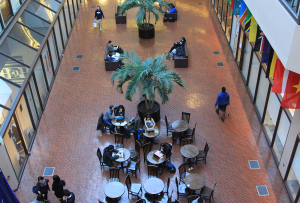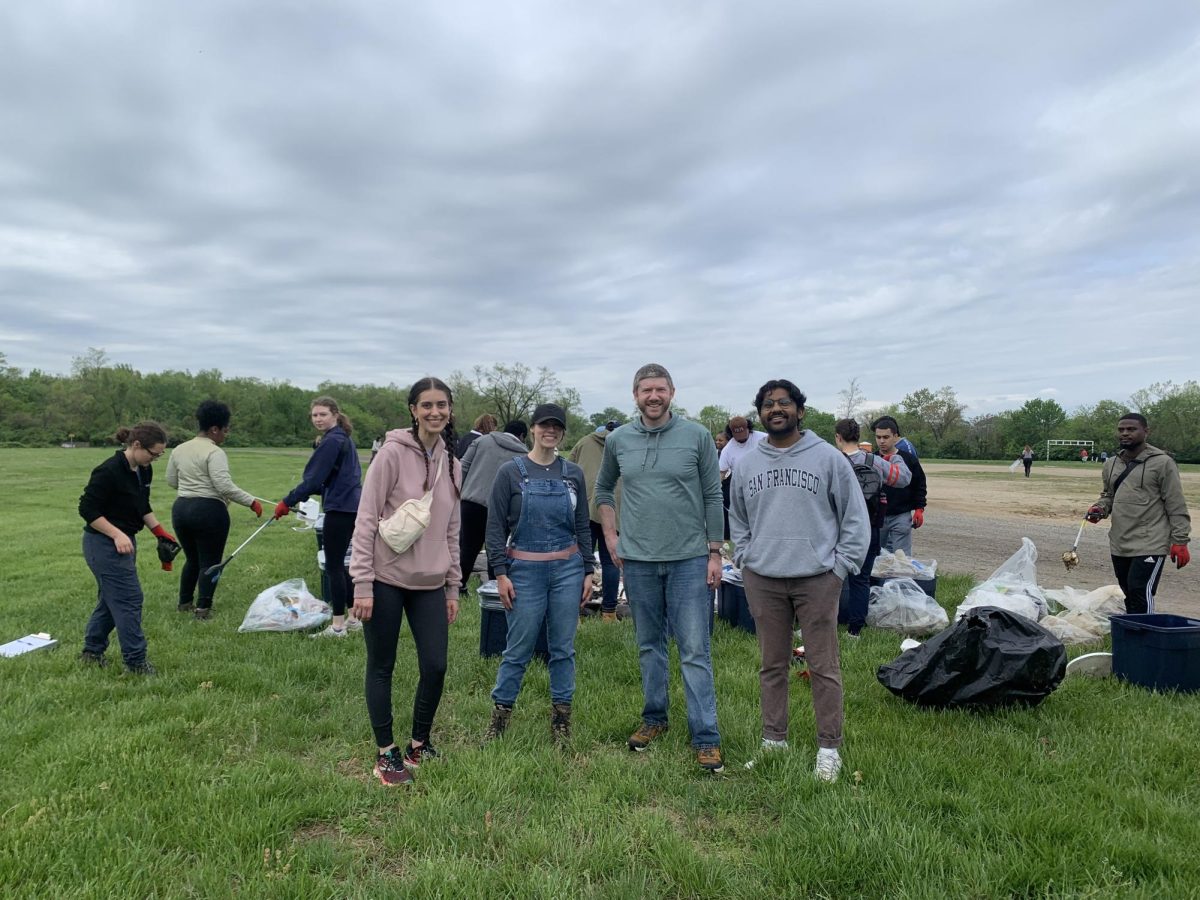
The struggle for students to find a table in the Intercultural Center Galleria will continue as efforts to create new study spaces in the ICC have slowed.
Although the Office of Planning and Facilities Management announced plans to renovate the Intercultural Center to create new study spaces for students in the School of Foreign Service in February, plans have stalled as a result of budgetary concerns.
The university approved plans to create a new study space and add furniture to the areas by the elevators on the first and second floors in response to an Idea Scale petition created by the SFS Academic Council in February; the post currently has over 400 votes.
The Office of Planning and Facilities has added furniture on the first and second floors, but has not taken any substantive action toward the creation of a singular study space.
Ali Whitmer, chief of staff to the provost, said that the SFS is eager to make the ICC a more study-friendly space. The Office of the Provost exercises control over the ICC, which houses the SFS Deans’ Office, in addition to several academic departments.
“We are anxious to provide additional seating and study space for students, as has been asked of us by the SFS Council and many other students,” Whitmer wrote in an email to The Hoya. “We believe we can do this in the immediate future with the furniture we’ve secured, while still balancing the many uses the galleria provides.”
Whitmer said that she hopes construction will begin soon and that the Office of the Provost has taken steps toward initiating construction, including conducting research on outlets, lighting and furniture concerns for the space.
“I also understand the desire to achieve more than what we’ve proposed in this first stage,” Whitmer wrote. “We want this to be a beautiful and functional student, faculty and administrative space and see this as stage one of a multi-stage project that we are working to fit responsibly within our budgets over several years.”
SFS Academic Council President Megan Murday (SFS ’15) attributed the delay in the project to a lack of resources and a low prioritization of the request.
“First and foremost, budgetary constraints have slowed improvements to the space,” Murday said. “The university has a finite amount of resources, and this project is not yet high enough on the list. However, I would argue that the university should prioritize renovations and updates to existing spaces, which are significantly cheaper than the construction of completely new buildings.”
Murday said that the addition of chairs to the elevator areas on the first and second floor are helpful, but fail to provide a longer-term solution.
“My hope is that such furniture will be a short-term fix while the university budgets for the full renovations and furniture investments necessary to create high-quality spaces to match the prestige of Georgetown,” Murday said.
Jinyoung Lee (SFS ’15), a senior representative on the SFS Academic Council, said that substantive problems in the ICC still need to be addressed, especially lighting and seating.
“Currently, the ICC Galleria has an inadequate number of chairs, desks, couches, outlets and lighting that we find many students having to sit on the floor while studying in between classes,” Lee said. “During the day, students rarely find seating space to chat with their professors, study in a group [and] participate in language table chats. During the night, students cannot study in the galleria because it has insufficient lighting.”
The SFS Academic Council hosted a town hall on study space Oct. 27, which allowed students to express their concerns to SFS Interim Dean James Reardon-Anderson and Associate Dean Mitch Kaneda. Nicolette Brownstein (SFS ’17) attended the town hall and said that both administrators seemed receptive to student concerns.
“They didn’t do a whole lot of talking while I was there,” Brownstein said. “They posed a couple of questions. Reardon-Anderson was definitely interested in what students were interested in, about whether students want classrooms at night, with the technology in the classrooms for projects and work during evening hours.”
Brownstein said she attended the event to express her concern that ICC space is not well utilized.
“One of the problems that I see is that the ICC is the central location for SFS kids and all kids and the space is not being fully maximized,” Brownstein said. “Almost every class is in that building [but] there are very few spaces that you can sit down and study.”
Brownstein said that the ICC could prove to be a beautiful and spacious area for students to work between classes.
“I think that there are a lot of really pleasant places to study,” Brownstein said. “I think the ICC Galleria during the day especially is such an open space with a lot of light and could possibly be a really nice place for people to meet or study or to have more spaces with the coffee shop, instead of just having it and leaving.”
The lack of study space in the ICC also affects business for More Uncommon Ground, a Students of Georgetown, Inc. storefront that is located in the galleria.
MUG Director Pat McDonough (MSB ’16) said that since students do not tend to spend extended periods of time in the ICC, large numbers of customers visit MUG during certain peak times, slowing the service.
“The big problem we see is that we only get busy during rush time, right before and after class, which means that customers have a really long wait time for their drinks … It leads to us having these big lulls when we don’t have any customer traffic, which is annoying for us from a revenue perspective and for customer experience,” McDonough said.
According to McDonough, increased study space would allow MUG to serve more customers and expand its hours.
“It would really help in off-peak hours, especially in the afternoon when big lectures are going on in the ICC Auditorium, as well as improve the customer experience, which would keep people coming back,” McDonough said. “During night time, we could have extended hours into the evening and provide dinner for people and things like that.”
McDonough said MUG staffers have petitioned administrators for study space in recent years with little success.
“We’re all behind having more study space. We’ve reached out several times to get the ball rolling, but we know that it’s a big project. We check in every year and try to get it going, and we always hear back that it’s a big financial investment for the university and that they’re working on it.”
Many students in the SFS spend most of their weekdays in the ICC, and Nick Ebert (SFS ’18) said that he is disappointed by the lack of quiet spaces to sit.
“I don’t feel like there’s any place for me to sit and do work,” Ebert said. “The atrium gets very loud during the day. It would be ideal if somewhere on the lower floors, where it’s very quiet, there’s a room where I could go. I have a lot classes in there and it would be good to just be close by to my classrooms.”
In addition to the SFS, a number of departments are housed in the ICC, including the government department, the economics department and many foreign language departments.
Esperanza Cirilo (SFS ’18) agreed and said that a defined study space would make time slots between her classes more efficient for getting work done.
“A lot of my classes are in the ICC,” Cirilo said. “I have between 20 minutes to an hour and a half between classes where I don’t want to leave. I would love to have a spot where I can go and do work. Because empty classrooms are really not available during the day. There’s not really tables available, so I just kind of sit on the floor. It’s not very comfortable and it’s not very conducive to doing work.”
Daniel Wassim (SFS ’18), a freshman representative on the SFS Academic Council, said that the renovations will help the ICC better represent the SFS.
“The ICC is the face of Georgetown’s premier institution, the SFS. And it’s not a pretty face,” Wassim said. “This is simply unacceptable for an institution of our caliber. The image of students sitting on the ground and studying in the ICC is an image of dereliction and neglect.”
The campaign for this new space is especially relevant after the creation of the Healey Family Student Center, which opened to students in September. Murday said she thinks that the success of the Healey Family Student Center reflects Georgetown students’ need and desire for more functional and effective study spaces
“High-quality academic space is a prerequisite for success as an institution of higher learning,” Murday said. “There is a real demand on campus for modern and functional study spaces. For example, the HFSC filled with new students immediately upon opening.”














